Latest recruit to the IMOCA class
Latest recruit to the IMOCA class is German skipper Joerg Riechers. Riechers has achieved considerable success in both the Mini and Class40 classes and at Düsseldorf Boat Show earlier this week announced his entry with co-skipper, French round the world veteran Sébastien Audigane, in the 2014-5 Barcelona World Race.
The new component of the extensive mare shorthanded offshore racing campaign, is once again being backed by Nikolaus Gelpke, Director of publishers Mare-Verlag (see mare.de), but while Gelpke has personally backrolled Riechers’ previous Mini and Class40 campaigns, with the IMOCA campaign they are on the hunt for additional backing.
“This is the first time we are looking for sponsors,” says Riechers. “Everybody thinks that mare is like Foncia, a company or a big sponsor and doesn’t need any money at all, but that is not the case.”
_470.jpg)
Barcelona World race organiser Andor Serra, with Jörg Riechers and Nikolaus Gelpke
Riechers compares the involvement of Gelpke in the 60 campaign to being like that of Sir Keith Mills with Alex Thomson or Bernard Stamm’s campaign where his boat is owned by Swiss artist Edouard-Marcel Sandoz’ foundation although their campaigns have sponsorship from Hugo boss and Cheminees Poujoulat respectively. “Nikolaus finances the project now and has invested the money and makes sure that the project is safe and can be executed, but the idea is that we will refinance the whole project with a sponsor,” explains Riechers, adding of his backer: “He is amazing. He is supporting the team full-on. He is super enthusiastic.”
While they are sponsor hunting, the Mare Racing Team’s IMOCA campaign is no pipedream and they have already acquired the 2008 Vendee Globe winning Foncia that Iker Martinez and Xabi Fernandez sailed as Mapfre in the last Barcelona World Race and Jeremie Beyou campaigned in this race as Maître Coq until he was forced to retire with keel issues. According to Riechers the giant fork broke at the end of the hydraulic ram used to cant the keel. “It not was screwed on in a perfect way. I don’t know if it was an old piece. In the end it was just a minor thing – a replacement and nothing structural.”
But it was enough to force Beyou to retire from the solo non-stop round the world race for a second time. “Hopefully they will change the rules some day,” muses Riechers. “It is the same for Bernard Stamm: a minor problem and you are out. Riechers says that perhaps it is time for the Vendee Globe to have rules similar to those of the Barcelona World Race where crews can stop in Wellington but will receive a two day penalty if they do. However he acknowledges that allowing stops also has the potential to open a Pandora’s box with teams ‘planning stopovers’ where they replace sails, bring on fresh supplies, fuel, etc etc.
“It is a difficult balance because you don’t want to change the character of the Vendee Globe too much. But you do want to open it up a little bit so that people don’t have to abandon the race for a stupid small thing...”
Riechers views the IMOCA 60 they have acquired as being perfect for their purposes. “It is still a boat with a really good performance. I think it might still be a touch quicker than Hugo Boss. It is the best of the 2008 generation.”
Buying one of the 2012 generation boats was too expensive for their project says Riechers, who believes that to pick up on these costs in the order of 2.5 million Euros. There are rumours of two of the 2012 generation boats already having been sold (possibly Banque Populaire and Virbac). However getting a top 2008 generation boat secondhand costs in the order of 0.95-1.05 million Euros.
However Riechers says that if they are able to secure a significant enough sponsor they may trade up from their present 60: “We have different scenarios. If we don’t find a lot [of sponsorship] we will modify this boat and do the Vendee Globe in it. If we find a medium amount of money we will change the boat after the Barcelona World Race and do the Vendee Globe with a 2012 generation boat. And if we do find a lot of money, we will build a new boat. The deadline for that is the middle of 2014.”
A new IMOCA 60 build in Europe, Riechers reckons is around 3.5 million Euros. “The IMOCA class is still quite affordable. If you break down the budgets and what has to be spent after you’ve sold the boat and which has to be financed net by a sponsor, it is a really good value for money.”
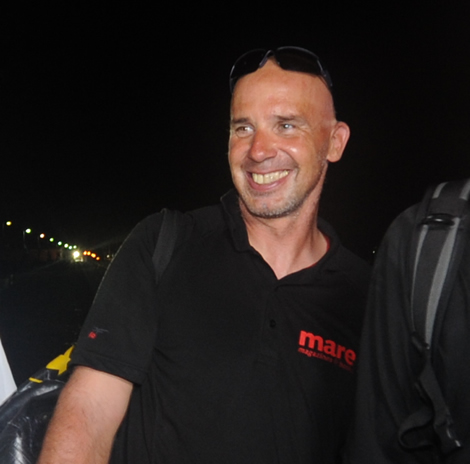
While most of the top French skippers juggle the Figaro class and their 60 campaigns (as Jeremie Beyou yesterday announced he will over this next cycle), Riechers intends to do the same with the Mini and the Class40, although both these programs he intends to phase down.
For the German skipper 2012 was one of his most successful seasons. In the Class40 he won the doublehanded Solidaire du Chocolat and then the Atlantic Cup (up the east coast of the USA) and was second in the Quebec-St Malo, while in the Mini he won the Trophee MAP. The Mini Transat he still views as unfinished business. “The first time [in 2009] I got really unlucky and the second time I trashed it myself through a tactical error, so I would like to do that again one day. I was originally planning to do it again this year but they made a mistake with the schedule. Originally I thought it would be possible to do the Transat Jacques Vabre and the Mini Transat, but unfortunately it is not possible.”
While 2013 will probably be his last season in the Mini, he intends to continue in the Class40 until the Route du Rhum at the end of 2014.
Riecher’s 2013 program in the Class40 will include the Normandy Channel Race, the Les Sables-Azores-Les Sables race, and the Transat Jacques Vabre and he will sail one of the major events in 2014 as a warm-up for the Route du Rhum.
Riechers’ present mare.de Class40 is a Sam Manuard-designed Mach 40 that stirred up a furore due to it being fitted with an adjustable forestay, since outlawed by the class. He says they only used this in the Solidaire du Chocolat and have since fixed the forestay (for the Atlantic Cup and on).
“It is a little bit of a performance thing, but more of a boat handling thing,” says Riechers of the adjustable forestay. “It is really a shame because if you are power reaching with the code sail up and with 8° of rake, the boat is so easy on the helm and it is not nose diving. Honestly I think it is shame that they banned it because it was a super invention. But okay, I can understand the reasons of the Class40.”
Riechers reckons that of more significance performance-wise in the Class40 are the sails. “We have a new concept for a Code 5, which is reef-able, like it is on the Mini. It is made out of thick nylon, which unreefed is a really good reaching sail which you use at 100-120° TWA. Reefed, it is a sail for atomic conditions downwind! I think there is a lot of speed to be gained through that.”
On his sail development Riechers works with Remi Aubrun of the All Purpose loft in La Trinité.
However aside from the major Class40 and Mini events, the priority throughout this period will be training on the IMOCA 60. Riechers says they will take delivery of their new boat mid-March and for this year they have scheduled local Breton races, the Grand Prix Guyader in Douarnanez and the ArMen Race from la Trinite around Ile de Yeu and back, followed by the Rolex Fastnet Race in August.
Riechers admits he has never sailed an IMOCA 60 before and obviously it is quite a step up. “The first time when I saw Cinnamon Girl [his first Class40] when we were looking for a boat in 2010, I thought ‘this is super big’. But I think the change from the 40 up to the 60, will be less of a shock. Also I have a good co-skipper with a lot of Open 60 experience in Sébastien Audigane. When you look at his CV he is one of the most experienced guys in France.” Audigane is currently en route to San Francisco with Giovanni Soldini aboard Maserati.
So the first major event for the Riechers on the 60 will be the Barcelona World Race at the end of next year. At the announcement at Düsseldorf Boat Show this week Andor Serra, Managing Director of the FNOB, the event organisers, reckoned that ten IMOCA 60s will be announcing their participation in their doubehanded round the world race over the course of this year and there might be as many as 15 boats on the start line.
There is also a rumour kicking around about a new IMOCA 60 set to be built for a Spanish team and possibly one of the 2012 generation boat heading that way too. Riechers imagines that after the issues he’s had in the Vendee Globe, Bernard Stamm would be a favourite in the Barcelona World Race if he entered. As he puts it “doublehanded that boat will be a weapon”.
With graduating up to the IMOCA 60, Riechers says comes an upscaling of his responsibility. “If you make a mistake in a Mini and say you trash your spinnaker, it is 2500 Euros. Do that on an IMOCA 60 and the phone call to your sponsor is less easy I think! It’s more like 20,000 Euros!”
The Mare Racing Team is also set to grow. While Riechers says he will continue to work with his project manager Charles Euverte, who has been with him since the outset of the mare campaign in 2008, they will have to employ two more people on the shore crew, bringing it up to four. They will base themselves out of the centre of the shorthanded offshore racing universe, the submarine base in Lorient.
“Everything in this team is French apart from the skipper and the sponsor," admits Riechers. "You have to be inFrance. In England it might still be possible, but in Germany the infrastructure to run a campaign like this isn’t there.”
A potential issue with getting into the IMOCA class at this stage is the present instability over the rule. At one extreme there has been talk and consider support within the class to go one design. But Riechers reckons it is likely to end up at a half way house point with for example new boats having to be fitted with a one design keel fin, which presumably after the Virbac Paprec 3 keel loss will have to be made from forged steel with minimum scantling requirements as was the case with VO70 keels. IMOCA is also believed to be setting a minimum mast weight and restricting the rig’s lowest centre of gravity point – both overdue additions to the rule. It is not clear at this stage if existing IMOCA 60s will be grandfathered through or if they will have to make the mods too.
As to the present – Francois Gabart looks set to win the race as a Vendee Globe rookie. Is there anything to be drawn from this? “I think what is amazing is his feeling about when to push the boat,” says Riechers. “I don’t know if he has a different sail from Armel, because I think he secured the win the day before Cape Horn, when he pulled out a 40 mile advantage. Then Armel was forced to tack to the west and from there on he was losing all the time. Or maybe Armel has an issue on his boat. What I found amazing was just before the Equator he was 1 knot slower all the time.”
In fact le Cleac’h appears to have been on the back foot throughout the hike up the Atlantic and one wonders if there isn’t some small damage to his boat (which remember is a sistership to MACIF, taken from the same moulds, etc) that could be causing him to go a knot slower? We’ll find out possibly on Sunday.
“Again sail development is the key to success nowadays," Reichers continues. "Getting a good boat and solid preparation are the two most important things because without that you can’t sail your boat up to 100% as you’d like to. But if you have a fast boat and a good team, what really makes the difference is the sail program.”
Certainly setting out on campaign three and a half years out from the next Vendee Globe, Riechers is setting himself up with a good runway of time to get himself up to speed. And with his 60 sailing combined with his continued participation in the Mini and Class40, there can be few sailors will be racing more miles shorthanded than he will.

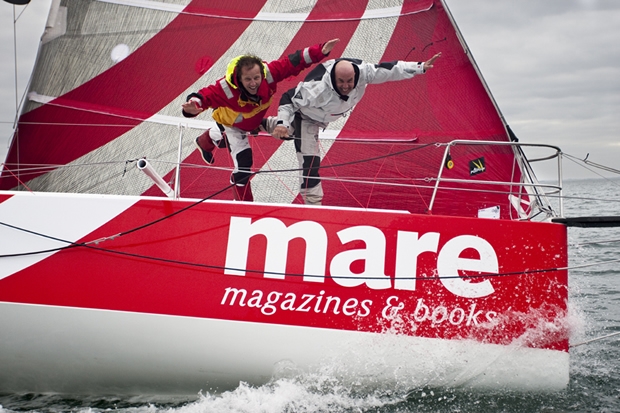
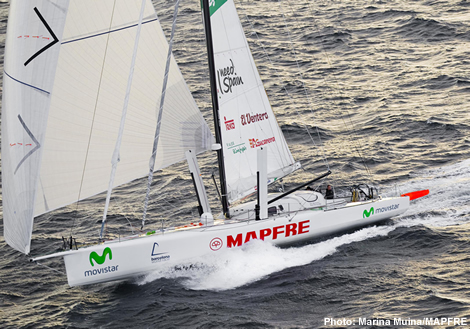
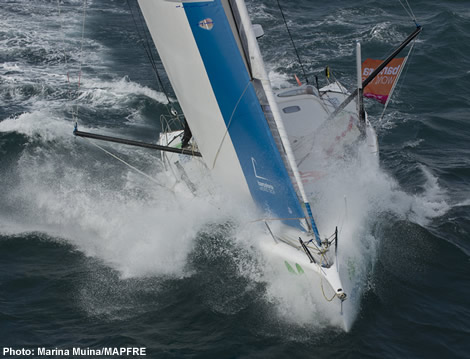
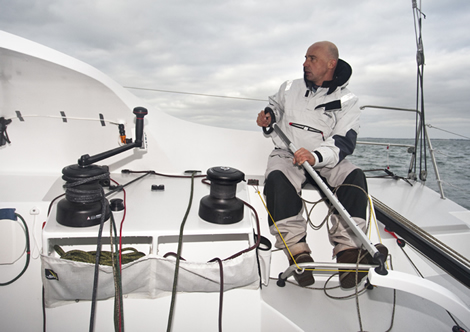











Latest Comments
Add a comment - Members log in